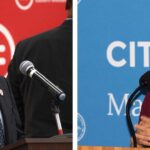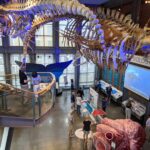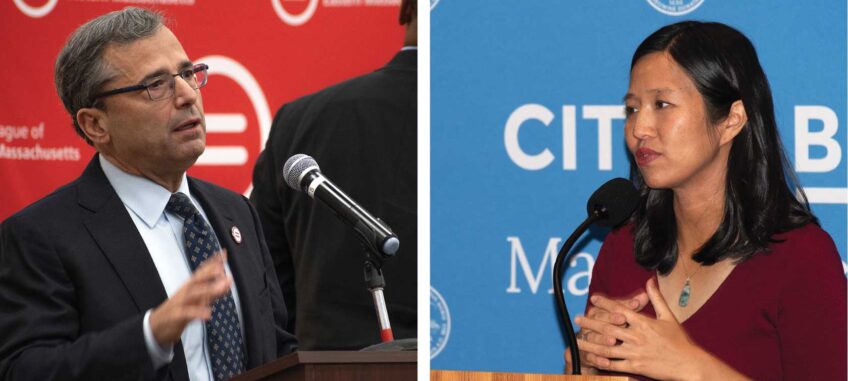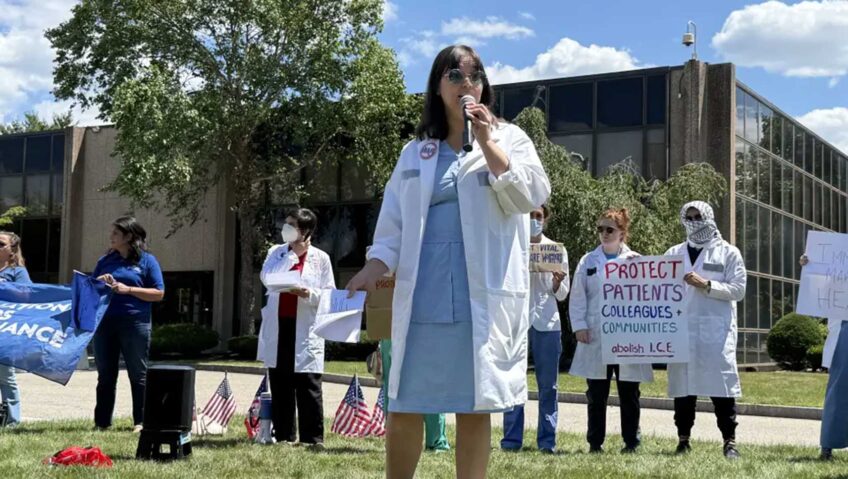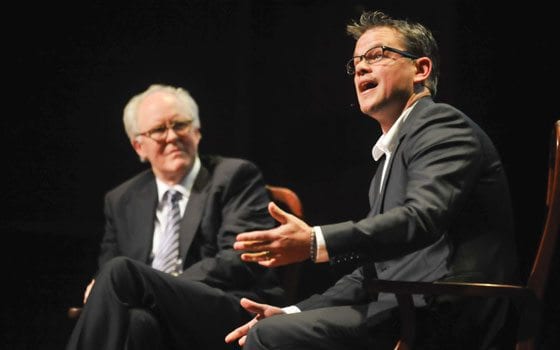
All 1,100 seats in Harvard’s Sanders Theater were filled last month when Matt Damon received the 2013 Harvard Arts Medal from the university’s president, Drew Faust, and joined an onstage conversation with fellow actor John Lithgow (’67).
After graduating from Cambridge Rindge and Latin School in 1988, Damon went on to study at Harvard, majoring in English. Leaving to take occasional acting jobs, he attended Harvard on and off until 1992. In the spring of 1993, he departed without graduating to pursue a film career in Los Angeles. Accompanied by his childhood friends Ben and Casey Affleck, Damon carried with him 40 pages of a screenplay that became “Good Will Hunting.”
The 1997 movie earned two Oscars and garnered nine Academy Award nominations. Damon, then 26, shared an Oscar with co-writer Ben Affleck for Best Original Screenplay. Damon was nominated for Best Actor, and his co-star Robin Williams won an Oscar for Best Supporting Actor.
Since then, Damon has starred in more than three-dozen films, including the blockbuster “Bourne Identity” and “Ocean’s Eleven” franchises, “Saving Private Ryan” and “The Talented Mr. Ripley.” In his latest film, “Behind the Candelabra,” he plays Liberace’s lover.
A co-founder of Arts First, Harvard’s annual weekend festival of the arts, Lithgow hosts the Harvard Arts Medal ceremony that kicks off the three-day event, now in its 21st year.
Lithgow said that at age 42, Damon “had already packed in the accomplishments of four or five extremely productive people as an actor, writer and producer as well as a philanthropist committed to solving global problems most of us aren’t even aware of, and as the father of four young daughters.”
Asked about childhood clues to his future career, Damon recalled how at age 5 he helped his mother douse excess smoke in their fireplace. He donned a fireman’s hat and red galoshes and pointed a fake hose at the embers. His story shows, Damon said, “how useful actors are in emergencies.”
“As long as I can remember, I always wanted to be an actor,” said Damon, who found a mentor in his high school acting teacher, Gerry Speca. “Ben and Casey Affleck and I, as well as a number of other people from that program, just came out with a real love of theater and acting. We had a world-class teacher and we were just lucky that we stumbled into this man at this point in his career.”
At Harvard, Damon found another important mentor, David Wheeler, then resident director at Harvard’s American Repertory Theater. Wheeler, who died in 2012, gave Damon priceless opportunities as an actor and understudy, nurturing the young man’s skills and confidence.
When a student asked him whether school or work was more important in developing as an artist, Damon advocated for both. “Apprentice yourself,” Damon said. “Log in your hours. Fail a lot. School can help and give you those hours that in the real world you might not get. Spend as much time doing it as you can.”
Lithgow asked Damon how he deals with movies that miss their mark at the box office or with critics. While admitting that such letdowns hurt, Damon said he sees novel projects as risks worth taking and spoke of his wife, Luciana Barroso, as a source of support and honest feedback.
When considering a role, Damon said he bases his decision on the director. “The director is the horse you bet on,” said Damon. “You ride the horse all the way to the end.”
Describing Damon as remarkably “self-possessed as a person” in a high-stress industry, Lithgow shifted the conversation from craft to life beyond movie sets. He asked Damon about his local roots.
“I’m a kid from Central Square, Cambridge,” said Damon. “Before rent control ended, it was a mostly middle-class and working-class neighborhood. It was a wonderful place to grow up. But between MIT and Harvard, we couldn’t help but feel a townie thing.”
Damon noted that Ben Affleck’s father was a janitor at Lowell House, where he lived as a Harvard student. Such town-gown experience informed “Good Will Hunting,” whose protagonist is a brilliant young janitor at MIT.
Speaking of the Boston Marathon bombing, Damon said that, like everyone else, he was “still in shock and wondering what it all means.” From childhood, Damon said, he has regarded the annual Patriot’s Day Marathon as “sacrosanct — a life affirming day.”
Lithgow asked Damon about his philanthropic endeavors, including water.org, the nonprofit he co-founded that enables hundreds of communities in Africa, South Asia and Central America to access safe drinking water. Without clean water, said Damon, “Every 20 seconds a child under 5 years old dies. That’s three little kids a minute.”
After President Faust presented the medal, Damon stepped up to the podium and briefly addressed the audience. He told the college students, “You are influencers in the world. Hold onto your humanity as you go out into the world.”

